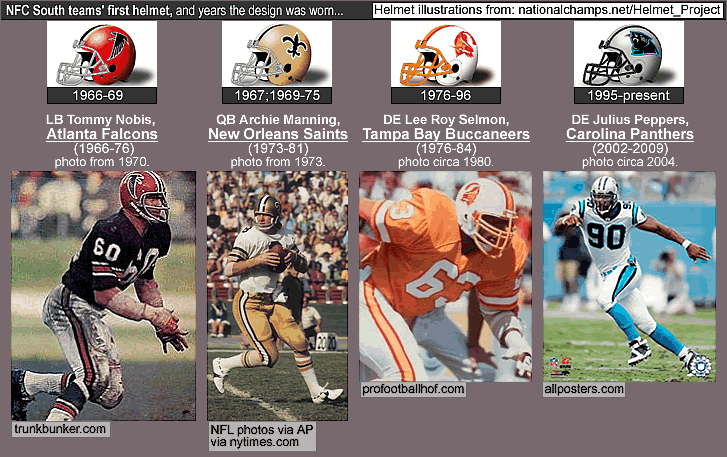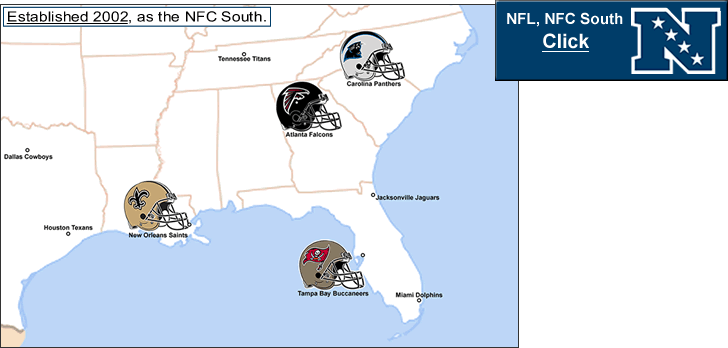
Photo credits- Atlanta Falcons’ Tommy Nobis, http://www.trunkbunker.com/bestnumber60.html. New Orleans Saints’ Archie Manning, NFL photos via AP via New York Times, ‘Football’s First Family‘. Tampa Bay Buccaneers’ Lee Roy Selmon, his page at Pro Football Hall of Fame site. Carolina Panthes’ Julius Peppers, Allposters.com via ScoresReport.com.
Helmet illustrations from: The Helmet Project.
The Atlanta Falcons were established in 1966, as the 15th NFL team. Their nickname was chosen as the winning entry of a name contest, the name submitted by a local school teacher. The Falcons’ first home was the just-built Atlanta-Fulton County Stadium, which opened in 1964 (and which was also the home of the Atlanta Braves ball club). The Falcons played there for 26 seasons, then moved into the state-built Georgia Dome in 1992. The Falcons’ distinctive black-profile-of-large-bird-in-downstroke logo was re-vamped in 1997 – the shape of the bird was made to look like the letter F, and red accents were added.
The Falcons are 0-1 in Super Bowl appearances [lost to Denver Broncos in the 1998 season].
…
The New Orleans Saints were the 16th NFL team, and began in the 1967 season. The Saints took their name from the fact that the franchise was born on November 1st [1966] – the Roman Catholic Church’s All-Saints’ Day. Their logo is the fleur-de-lis (flower of the lily, in French), which is a symbol of the city of New Orleans, and evokes the city and region’s French and Acadian history. The Saints spent their first 3 decades as the NFL’s least successful franchise. It took the Saints 34 years to win their first playoff game (in 2000). The 21st century has been a different story. 4 years after the city recovered from Hurricane Katrina (Aug-Sept.2005), the Saints appeared in their first Super Bowl game (Super Bowl XLIV [44]), and upset the favored Indianapolis Colts. Trailing 10-6 to start the second half, the Saints successfully executed the first onside kick before the 4th quarter in Super Bowl history. The Saints went on to win 34-21, bringing New Orleans and the state of Louisiana its first professional sports title. The Saints first called Tulane University’s Tulane Stadium home, from 1967-74, then moved into the gargantuan Louisiana Superdome in 1975. In 2005, the Superdome was severely damaged by Hurricane Katrina, and the Saints were forced to set up temporary base in San Antonio, TX. The Saints played their first 3 home games at the Alamodome in San Antonio. Home games 4-7 were played at LSU’s Tiger Stadium in Baton Rouge, LA (69 miles north of New Orleans). Their final home game of 2005 was played at Giants Stadium in New Jersey. The Saints resumed playing at the repaired Superdome in 2006.
New Orleans Saints: 1 Super Bowl title (2009).
The Saints are 1-0 in Super Bowl appearances.
…
The Tampa Bay Buccaneers were, along with the Seattle Seahawks, the 27th and 28th expansion teams in 1976. Both played their first season in the opposite conference, then switched the next season (1977), with Tampa Bay ending up in the NFC Central (from 1977-2001). The Bucs were the worst-ever expansion team (NFL or otherwise), going 0-14, not winning their first game until the 13th week of their second year. But they improved swiftly after that (with a strong defense), first making the playoffs in their 4th year in 1979, going all the way to the NFC Championship Game (losing 9-0 to the Rams). The Bucs wore light orange with red trim; their logo was a feathered-hat-wearing pirate who looked anything but threatening. That was changed in 1996, with a metallic brownish-gray, called pewter, becoming their dominant color, and a pirate flag on a sword being their new logo. The Bucs won the Super Bowl in the 2002 season, blowing out the Raiders (Super Bowl XXXVII [37]). The Bucs played at Tampa Stadium (aka the Big Sombrero, for it’s oblong shape) from 1976 to 1997, and since 1998 have played at Raymond James Stadium in Tampa, FL. [note: the term Tampa Bay refers not to a city, but to the metro area of Tampa/St. Petersburg/Clearwater/Bradenton.]
Tampa Bay Buccaneers: 1 Super Bowl title (2002).
The Buccaneers are 1-0 in Super Bowl appearances.
Note: featured player Lee Roy Selmon recently passed away, {see this, from Sept.4,2011, from thesportingnews.com, ‘Hall of Fame defensive end Lee Roy Selmon dies at 56‘.}
…
The Carolina Panthers joined the NFL in 1995, as the 29th franchise (along with the Jacksonville Jaguars, the 30th franchise). Charlotte, NC-based, but representing both North and South Carolina, the Panthers were able to privately fund the building of their Carolinas Stadium through the sale of over 40,000 permanent seat licenses, which were all bought in less than a day. Unlike previous expansion teams, Carolina (and Jacksonville) were very competitive from the start. The Panthers were 7-9 in their first season, and in their second season (1996), the Panthers were 12-4, made the playoffs, and went all the way to the NFC Championship Game, losing to Green Bay. [The Panthers made it to the Super Bowl 7 seasons later, in 2003.] In 1995 they played at Clemson University’s Memorial Stadium, in Clemson, SC. Since 1996, they have played at their 73,000-capacity stadium in uptown Charlotte, which is now called the Bank of America Stadium.
The Panthers are 0-1 in Super Bowl appearances [lost to the Ravens in the 2003 season].
_
Thanks to the contributors to the pages at en.wikipedia.org, ‘NFC South‘.
Thanks to misterhabs.com/Helmets , aka Helmets, Helmets, Helmets site. At that site I got most of the helmet illustrations for the 8 maps in this series. There are two problems with this set of helmet illustrations at the HelmetsX3 site – the metallic helmets are shown too dark, and the site hasn’t been updated since 2009 or so. So all the helmet illustrations in this series are from the HelmetsX3 site except for the helmet illustrations of all the silver or gold (or pewter) helmeted teams – Carolina, Dallas, Detroit, Oakland, New England, New Orleans, San Francisco, and Tampa Bay; as well as new Buffalo, recently new Arizona, recently new Indianapolis, and also Tennessee helmet illustrations, all of which I found at each team’s page at en.wikipedia.org… ‘National Football League‘.
Thanks to mlive.com, for the photo of the Vince Lombardi Trophy.

